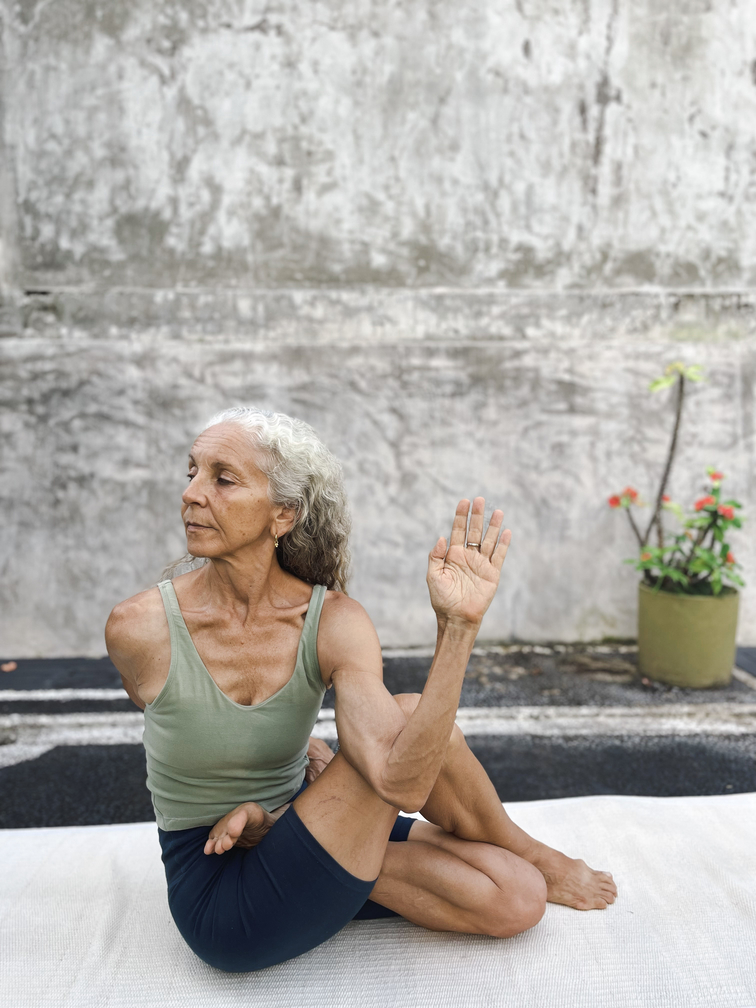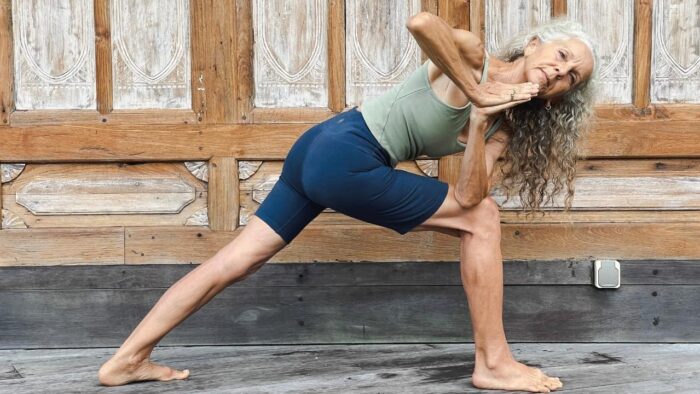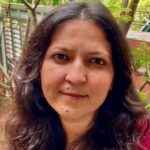Myra Lewin is the founder of Hale Pule Ayurveda and Yoga, and after watching her session during Indica Yoga’s Global Festival of Yoga, I knew I had to interview her to find out more about her in-depth knowledge of the practices. Her approach to learning and teaching is experiential and while she respects the academics for a sound understanding of Ayurveda and spiritual practices, her advice is to learn and teach from experience. She used her corporate life to offer yoga and Ayurveda in a way that educates and transforms the practitioner, and in this interview, she shares how she began her spiritual journey and how an Ayurvedic diet and lifestyle complements yogic practices.
Sophia: How did your journey to yoga and Ayurveda begin, and how did it lead to Hale Pule?
Myra: My Yoga journey began in 1987 with meditation and a short while later with asana. It was so helpful to me as I had been completely caught up in the outside world of doing and not much being. A few years later, I left the corporate world and focused on Yoga, I changed my life completely.
Ayurveda was introduced to me by my Yoga teacher. At first it seemed too complicated and unfamiliar. Once I tried it for myself, things began to fall into place that I had been trying to resolve for years through other means. It turned out Ayurveda was something I had been looking for all of my life.
I had been a teacher in a number of areas in my life including swimming, accounting, behavioural management, and Yoga so it made sense to me that I would yet again share Ayurveda and Yoga through education. Ayurveda and Yoga are a foundation for living the lives we are each meant to have. To feel well, to have a deep sense of ourselves and experience life fully. Hale Pule was born on Maui where we spent 10 years, followed by 9 years on Kauai. Hale Pule means house of prayer in the Hawaiian language and I regard Hale Pule as the sanctuary that we offer for the individual to learn to care for their body, mind and spirit in this life.
Sophia: You’ve authored books on Ayurveda and you have two podcasts on the subject. In your experience, what are the major problems that most people face with their diets and how can we break unhealthy eating patterns?
Myra:The most significant problems people are facing with their diets is confusion, disconnection from their bodies and themselves. The modern approach, now driven by the commercialization of food and humanity is changing so frequently that people are lost. As a result, people are eating in ways that are harming themselves without realising it. The modern approach is causing many more problems than it is solving. The mind is very stubborn and gets attached. Much disharmony in the body begins with wrong thinking. This is why Ayurveda is so important at this time. We educate people to understand how their bodies and minds work in connection with their spiritual selves so that they can make wise choices and learn through their direct experience. We have the ability to heal and to make wise choices. We’ve been trained to use the lower intellect and not trust ourselves. But we have the tools to make the switch and lead a full life.
Sophia: In addition to food, Ayurveda also addresses lifestyle through its application of Dinacharya and Ratricharya. Do you feel that Ayurveda has become very food centric and is it necessary to follow Dinacharya and Ratricharya to receive the full benefits of Ayurveda?
Myra: It is necessary to follow a dinacharya of some sort. We all do something each day, adjusting that in order to feel better will interest people once they have suffered enough to be willing to make changes. Many people have normalised a very low level of wellbeing. Just a few simple steps can make a big difference in how one feels. The dinacharya is just as important as the food changes, if not more so. Routine reduces stress, enhances the quality of rest and the strength of agni, the digestive capacity. We must remember that this is about the mind and everything has an effect, including the Ratricharya, or seasonal shifts. This one is more subtle for many people but needs to be considered in the appropriate ways for each individual.
Sophia: Is an Ayurvedic diet preventive, curative or both?
Myra: The Ayurvedic approach to diet, ahar and lifestyle, vihar are both curative and preventive. We find that we can reverse the disease process and prevent further problems. It’s all about working with the natural design of the body and mind from the inside out, rather than trying to fix symptoms from the outside in. Ayurvedic diet strengthens the body, mind and spirit, no matter what that starting point is.
Sophia: During your presentation in our Global Yoga Festival, you had mentioned personal struggles and how yoga and Ayurveda helped you heal? Can you share those experiences and tell us how these practices helped you deal with difficult emotions?
Myra: I had attempted to be healthy for many years before becoming ill. But all through that time I was overeating to avoid unpleasant feelings and emotions. Once it was pointed out to me, I couldn’t deny it any longer. The changes I made to balance the doshas and the elements within, allowed the function of my mind to become more reasonable, less extreme in my actions. I slowed down from a frantic pace of life to something that not only allowed me to heal but to enjoy life in a new way. And from there everything continued to blossom and evolve. I have been on the planet a while now, it’s a long tale that continues each day. :)
Sophia: What is it like teaching Indian spiritual practices to Western students, especially now that yoga and Ayurveda is so mainstream even in the West?
Myra: Although the practices and beauty of Ayurveda are an incredible expression of what India has given to the world, the Vedas, from which Ayurveda and Yoga come, were given to humanity, including all of the world. So my goal is to support people from all walks of life all over the world by offering the teachings of Ayurveda and Yoga in ways they can understand and apply in their modern lives. A very interesting point is working with clients of Indian heritage who are living in other countries now, influenced by Western culture. It creates some confusion, but I find great joy in having them rediscover themselves.

Sophia: What are you reading at the moment and what are some of your favourite books on spirituality?
Myra: The Upanishads are a favourite of mine. I also enjoy Krishnamurti and Alan Watts.
Sophia: While yoga and Ayurveda are complementary disciplines, Ayurveda is often ignored in favour of a purely physical yoga practice. Your views on this?
Myra: We teach them as a holistic approach to living. Life is spiritual. We don’t need to separate ourselves from life to “be spiritual”. With Ayurveda and Yoga together we can maintain a sense of balance and approach life in the way that works best for each of us.
Sophia: What are your thoughts on a plant-based diet or any of the many ‘special’ diets that seem to have mushroomed in the past decade?
Myra: We focus on approaching food and eating as a sacred step in life each day. A balanced approach brings balanced health in the body and mind. I find myself solving lots of messes created by the latest fads and have not seen any success with them long term for people. Our goal is to have people understand what is happening with their bodies and minds so that they can spend more of their time enriching themselves through the experience of living rather than focusing on the latest fad trying to fix some problem. Less suffering, more joy.
Sophia: Any advice you have for young students who wish to pursue a career in yoga and Ayurveda?
Myra: Take the experiential approach rather than the academic. Filling your head with more and more information will not get you what you want. Life is meant to be lived and we are meant to feel well doing it. The beauty and richness of life is in the subtlety and it is all here for us.
For further information, visit Hale Pule Ayurveda and Yoga





